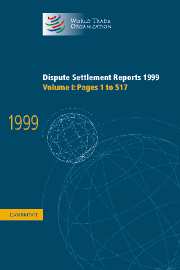Book contents
- Frontmatter
- Contents
- Korea - Taxes on Alcoholic Beverages (WT/DS75/AB/R, WT/DS84/AB/R, WT/DS75/R, WT/DS84/R,): Report of the Appellate Body
- Korea - Taxes on Alcoholic Beverages (WT/DS75/AB/R, WT/DS84/AB/R, WT/DS75/R, WT/DS84/R,): Report of the Panel
- Australia - Measures Affecting Importation of Salmon (WT/DS18/9): Award of the Arbitrator (under Art icle 21.3(c) DSU) Australia - Salmon
- Japan - Measures Affecting Agricultural Products (WT/DS76/AB/R, WT/DS76/R): Report of the Appellate Body
- Japan - Measures Affecting Agricultural Products (WT/DS76/AB/R, WT/DS76/R): Report of the Panel
- Cumulative Index of Published Disputes
Japan - Measures Affecting Agricultural Products (WT/DS76/AB/R, WT/DS76/R): Report of the Appellate Body
Published online by Cambridge University Press: 22 December 2017
- Frontmatter
- Contents
- Korea - Taxes on Alcoholic Beverages (WT/DS75/AB/R, WT/DS84/AB/R, WT/DS75/R, WT/DS84/R,): Report of the Appellate Body
- Korea - Taxes on Alcoholic Beverages (WT/DS75/AB/R, WT/DS84/AB/R, WT/DS75/R, WT/DS84/R,): Report of the Panel
- Australia - Measures Affecting Importation of Salmon (WT/DS18/9): Award of the Arbitrator (under Art icle 21.3(c) DSU) Australia - Salmon
- Japan - Measures Affecting Agricultural Products (WT/DS76/AB/R, WT/DS76/R): Report of the Appellate Body
- Japan - Measures Affecting Agricultural Products (WT/DS76/AB/R, WT/DS76/R): Report of the Panel
- Cumulative Index of Published Disputes
Summary
INTRODUCTION
Japan and the United States appeal from certain issues of law and legal interpretations in the Panel Report in Japan - Measures Affecting Agricultural Products. The Panel dealt with a complaint by the United States relating to the requirement imposed by Japan to test and confirm the efficacy of the quarantine treatment for each variety of certain agricultural products (“the varietal testing requirement”).
Under the Plant Protection Law of 1950 and the Plant Protection Law Enforcement Regulation of the same year, Japan prohibits the importation of eight agricultural products originating from, inter alia, the United States on the ground that they are potential hosts of codling moth, a pest of quarantine significance to Japan. The prohibited products are apples, cherries, peaches (including nectarines), walnuts, apricots, pears, plums and quince. The import prohibition on these products can, however, be lifted if an exporting country proposes an alternative quarantine treatment which achieves a level of protection equivalent to the import prohibition. The exporting country bears the burden of proving that the proposed alternative treatment achieves the required level of protection. In practice, the alternative quarantine treatment proposed is fumigation with methyl bromide, or a combination of methyl bromide fumigation and cold storage. In 1987, Japan's Ministry of Agriculture, Forestry and Fisheries developed two guidelines as model test procedures for the confirmation of the efficacy of this alternative quarantine treatment: the Experimental Guideline for Lifting Import Ban - Fumigation, which outlines the testing requirement applicable to initial lifting of the import prohibition on a product, and the Experimental Guide for Cultivar Comparison Test on Insect Mortality - Fumigation (the “Experimental Guide”), which sets out the testing requirement for approval of additional varieties of that product. The latter requirement is the varietal testing requirement at issue in this dispute. The United States claimed that this varietal testing requirement was inconsistent with the obligations of Japan under the Agreement on the Application of Sanitary and Phytosanitary Measures (the “SPS Agreement”).
- Type
- Chapter
- Information
- Dispute Settlement Reports 1999 , pp. 277 - 314Publisher: Cambridge University PressPrint publication year: 2001
- 6
- Cited by

